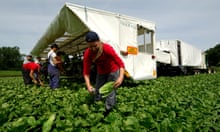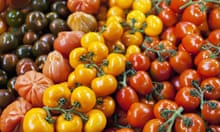Octopus-like robots are plucking strawberries in Spain, in the US machines are vacuuming apples off the trees, and in the UK they are feeding and milking cows. Robots are taking over fields around the world, and last week food and rural affairs secretary Andrea Leadsom suggested they could help replace the thousands of EU workers who currently help put food on British tables.
And it is not just Brexit that is forcing the agricultural industry to embrace the next phase of mechanisation. Farmers are already having to rethink their operations in the face of higher minimum pay – mainly a result of the national living wage for over-25s, which came into effect last year.
Robotic milking machines, in which cows queue up to milk themselves, are now mainstream, while systems tat automatically feed or track the health of livestock are on the rise. Next month, British researchers will attempt to produce cereal crops on a “hands free hectare” in Shropshire – where everything from planting seeds to assessing and harvesting the crop will be done without humans.
Some farmers say planned increases in minimum pay alone would put them out of business if they did not find ways to improve productivity, or the amount of economic output per hour worked.
The fall in sterling since the referendum has already reduced eurozone residents’ enthusiasm for working in the UK because it has reduced the value of the money they can send home. The potential loss of access to a vast pool of labour post-Brexit means farmers are beginning to wonder if robots might be the answer.

The industry is expected to require 90,000 seasonal workers a year by 2021, on top of more than 250,000 permanent staff – more than three-quarters of whom currently come from the EU. If just one in five permanent workers decides to go home, an additional 50,000 people will be needed, on top of the 85,000 seasonal workers required if access to EU migrants is cut off in 2019. Hence the appeal of those machines.
Harry Hall, managing partner of Hall Hunter Partnership, which supplies strawberries, raspberries, blackberries and blueberries to customers including of Marks & Spencer and Waitrose, told the National Farmers Union conference in Birmingham this week that he thinks robotic picking machines, which use 3D cameras and sensors to automatically gauge when fruit is ready before picking and grading it ready for shipment, are not yet economically viable. But a change in the flow of workers from the EU could soon change that.
“If Theresa May decides in 2019 ‘that’s it, you’re on your own’, that would radically impact my approach to robots. I would have 500 robots in two years and probably spend £5m on it.”

Robots Hall has seen pick at about a third of the speed of a human. However, their financial appeal lies in the fact that they can pick all day and all night.
Simon Blackmore, head of robotics and automation at Harper Adams University, a specialist agricultural establishment in Shropshire, says: “No new technology is needed; it is just a case of getting on with it. It could be two or three years away. We can just start to build these things.”
He thinks smaller-scale machines, such as laser weeders and drones, will have broader appeal than large-scale harvesting and sowing technology on farms today. But he admits that established producers of agricultural machinery are not keen to invest in hi-tech gadgets that may disrupt their existing businesses. For example, Innovate UK, the government-backed innovation agency, is supporting development of a strawberry picker in collaboration with a major fruit grower, but can’t find an agricultural machinery firm to manufacture the appliance.
The patchy availability of good broadband in rural locations and the legal restrictions on, for example, the activity of flying drones, could also stand in the way of farm automation.
Technology requires heavy upfront investment that some farmers cannot afford. Government support in terms of grants, tax allowances or cheap loans may be required. Retailers and food processing companies may also need to offer longer-term contracts and guaranteed prices so that farmers can invest for the future.
David Speller, a Derbyshire poultry farmer who spoke at the NFU conference, says he is already finding it difficult to recruit staff. He is looking at moving on from his current use of technology – such as using sensors to monitor bird health – towards buying robots that carry out physical tasks such as refreshing bedding. But he says the technology is probably still two or three years away and the company he is working with has to raise about £1m to develop it.
“I think Brexit may go two different ways for two different types of companies,” Speller says. “Depending on the outcome of the negotiations, some, if they feel a financial squeeze, will react by cutting back on investment. Some will take that as a motivator to invest, as they will say we need efficiency for the future and some technology to help us with that.”
James Simpson, managing director of Kent apple producer Adrian Scripps, a major supplier to Tesco, is one of those who has already decided to invest. The company has ploughed more than £4m into packing technology since 2013, and this has enabled it to expand without taking on additional workers. Apples are now bagged by robots and loaded on to pallets ready to be transported to retailers. The system is operated by two or three people, each packing about 20 bags a minute. Previously, the rate was less than three bags a minute.
Adrian Scripps recruits nearly all of its 220 seasonal pickers and about 60% of its nearly 100 permanent staff from the EU. Simpson says: “Brexit is something that is focusing the mind. We’re very aware that attracting labour to the UK can be a challenge.”
He is looking at automating jobs such as lawnmowing – which several British orchards already do – and is talking to organisations around the world about potential picking technology.
“Apples are not so easy to pick [using robots], although there are working versions in the US and Israel and test rigs in the UK. Some predict that rigs will be harvesting robotically in two to three years, but my gut feeling is that robotics is five to ten years away,” says Simpson.
“There’s no denying the fact that we need temporary overseas labour for UK agriculture. Robotics are not going to happen quickly enough for Brexit. Without access to European labour, UK agriculture dies on its feet.”
Laurence Olins of British Summer Fruits, which represents most of the UK berry industry, agrees that robots are not the answer in the short term. “We’ will be using seasonal pickers for at least 10 years,” he says. “If Andrea Leadsom thinks otherwise, she’s mistaken.”
Olins says the soft fruit industry alone needs 31,000 people a year, and the industry needs to know how it can access those workers well in advance of the UK’s probable 2019 exit from the EU.
“If you can’t pick your crop, you can’t grow it and you will go out of business. There’s no halfway house. If we only get half of them, we will have an industry that is half the size.”
WHAT THEY DO IN SPAIN
As the recent courgette crisis and shortages of lettuce, aubergines and broccoli have shown, Spain’s fame as the vegetable garden of Europe is well deserved. The country’s huge agricultural sector - citrus fruits, courgettes, lettuces, tomatoes and strawberries - feeds a huge demand.
There has been a major shift towards mechanisation since the 1950s, but just as in the UK, many crops still need to be harvested by hand, and many farmer rely on migrant labour. Even where mechanisation can be used, picking machines tend to be too expensive and impractical for small-scale farmers.
“It depends a on the area, the crop, the local labour supply and the size of the harvest,” says José Ramón Díaz, a technical adviser at Asaja, Spain’s largest farming association. “When a crop needs to be harvested very quickly, sometimes there aren’t enough local hands, so we get in foreign workers - as in other countries.”
Díaz says tension between locals and migrant workers , predominantly from North and Sub-Saharan Africa and eastern Europe – is not a big problem, as many of the foreign workers have proper contracts and return to the same farms year after year. “They’re known and that’s important,” he added.
Alfrut - a company in the south-western province of Huelva that exports strawberries, raspberries, and other fruits around the EU - still harvests by hand.
“There is a machine that gathers strawberries, but you have to adapt the crop to the machine,” says Agustín Muriel, a technical and quality control expert at Alfrut. “If we were to use machines, we would have to modify our entire infrastructure and it would require a lot of investment in machinery, which is designed mainly for large areas and really big companies.”
Muriel estimates that between 60% and 65% of the company’s workers are foreign, most of them from Morocco and Romania.
He adds that the traditional, manual approach is likely to continue for the foreseeable future, as fruit prices aren’t high enough to allow farmers to make big investments in machinery or spend money reconfiguring their operations.
He also says that legal contracts and the fact that most migrant workers tend to spend only five or six months a year in farming areas mean that there are few problems with local communities. “People tend get on well here, because there’s enough work to go around in our area.”
Sam Jones in Madrid









Comments (…)
Sign in or create your Guardian account to join the discussion